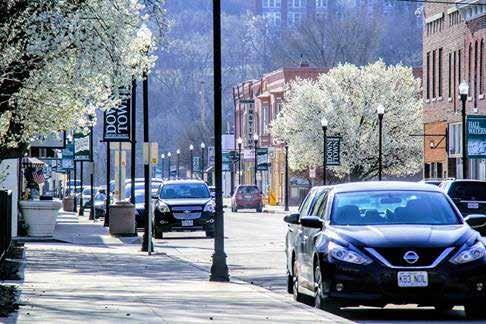
10 minute read
Opportunity Zones
Opportunity Zones Program: Challenge And Opportunity For Communities
by Lee Langerock and Melinda Mehaffy
The Opportunity Zones Program is an economic development tool designed to encourage reinvestment in areas of high economic distress. As part of the 2017 US Tax Cut and Jobs Act, the Opportunity Zones Program provides a tax benefit for individuals with capital gains who invest in federally designated Opportunity Zones.
Opportunity funds are the investment vehicle for those individuals seeking to use the tax benefit. Opportunity funds can finance commercial and industrial real estate, housing, infrastructure, and current or start-up businesses located in the opportunity zones. While the IRS has only recently delivered final rulings for the program, individual investors and institutional funds are lining up to take advantage of this newly offered tax benefit.
In December 2017, the U.S. Tax Cut and Jobs Act was enacted. The Opportunity Zones Program formed from that legislation as an economic development tool designed to draw private investment into areas that experience a high level of socio-economic distress. There are 8,700+ opportunity zones in the U.S. and 161 zones in Missouri.
Even though the odds are that your community does not currently have opportunity zones, there is an impact. What does the Opportunity Zones Program mean for your community?
The vision of the Opportunity Zones Program is to positively change the economic vitality and sustainability of a community. Opportunity zones are census tracts that were nominated in 2018 by each state’s governor, then qualified federally to be designated as part of the Opportunity Zones Program. The Opportunity Zones Program is designed to benefit an investor by providing deferral and forgiveness of the federal tax on capital gains invested in a qualified zone. Since the federal government awarded opportunity zone designations in 2018, cities and economic development organizations have been searching for ways to capture qualified opportunity fund investment to the benefit of their communities. Because of opportunity zone legislation, philanthropic and private foundations, as well as federal agencies, are rethinking how they are doing business.
“We’ve seen it with the establishment of the White House Opportunity and Revitalization Council; the U.S. Economic Development Administration’s (EDA) additional priority listing authorizing funding priority in opportunity zones; and U.S. Department of Housing and Urban Development’s (HUD) change in policy. Developers and institutional funds are paying attention to the Internal Revenue Service’s (IRS) guidance and rulings for the Program. This means cities and towns across Missouri should be aware of both federal dollar and private investment focus, and be prepared to compete for that attention.”
At the Act’s onset, the president signed an Executive Order (#13853) establishing the White House Opportunity and Revitalization Council. The Council is evaluating support for urban and economically distressed areas, including qualified opportunity zones for grants, financing and other assistance. This movement aligns 160 federal programs to target, provide preference or add support to opportunity zones. In April 2019, the Council released the implementation plan with key emphasis on 1) economic development, 2) entrepreneurism, 3) safe neighborhoods, 4) education and workforce development, and 5) measurement and analysis. As an example of how the federal grant landscape may change, communities not typically qualified for EDA funding received a boost in 2018 when opportunity zones became a qualified area for EDA investment. This was reinforced in 2019, when the U.S. Assistant Secretary of Commerce for Economic Development announced that the EDA is adding opportunity zones as an investment priority.

In 2019, federal legislation was introduced to expand zone designations. New zones were designated for disaster relief. That momentum of change is anticipated to push into 2020. States throughout the U.S. are aligning tax code and incentive packages to leverage the anticipated private investment and expansion of local designations. Opportunity zone institutional funds have been holding for a Final Ruling on tax code from the Internal Revenue Services (IRS), released Dec. 19, 2019, and codified once printed in the Federal Register.
Opportunity zones are on the radar of every multifamily, workforce housing and commercial real estate developer in the nation. By rule, to receive the investment benefit, businesses and investors must deploy their capital with the intent of profit. Investors can live anywhere in the U.S. and the investment, made through a qualified opportunity fund and/or qualified business, can be in any designated zone. As a wide-open field, community success in attracting investor attention translates when the community is prepared to meet business and developer interests proactively. The question then becomes, “what is the investment impact on my city’s financial bottom line”?
The Kresge and Rockefeller Foundations are deploying millions of dollars on opportunity zone impact. Both cities of Kansas City and St. Louis have benefited from the Rockefeller Foundation’s push to improve economic opportunity and the Foundation’s
As part of the process to continue evolving its local Opportunity Zones Program, the City worked to develop a community marketing plan, including an asset study to define local opportunity and the community’s portfolio of properties.


As part of the process to continue evolving its local Opportunity Zones Program, the City worked to develop a community marketing plan, including an asset study to define local opportunity and the community’s portfolio of properties.
All photos by Kevin Morgan, Kevin Morgan Photography
leadership in promoting and fine-tuning Opportunity Zones Program policy. Urban areas are actively engaged in pursuing opportunity zone investment. However, a good percentage of opportunity zones are in rural communities and counties, where business and real estate development opportunities are not as well known, yet business and community investment ripples significantly.
The city of Excelsior Springs, Missouri, provides an excellent example of preparedness to pursue community and business development. Excelsior Springs is uniquely identified for its historical districts and emphasis on redevelopment. The Opportunity Zones Program designation covers most of the land mass within the Excelsior Springs' city limits. In early 2019, the city of Excelsior Springs contracted Prep the Page LLC to help develop an Opportunity Zones Program strategy outline. During that process, the City determined three key priorities:
• Help educate local citizens about the direct and indirect benefits of continuing to invest in their community;
• Inform aligned outside interests of the advantage Excelsior Spring's Opportunity Zones provide for their return on investment; and
• Encourage qualified real estate and business opportunity zone investments.
Opportunity zones are different from enterprise and empowerment zones. However, the Program can overlap and stack with other economic development incentives offered at the local, state and federal level. Encouraging investors to contact the City prior to initiating development is a key factor in initiating a proactive approach.
“We want to make sure it is understood there are opportunities for business and investors to grow in Excelsior Springs," said Molly McGovern, city manager for Excelsior Springs. "Pursuing and addressing investment fits well with our existing business and community development mission. The City is being proactive regardless of program.”
As part of the process to continue evolving its local Opportunity Zones Program, the City re-engaged Prep the Page to facilitate the development of a community marketing plan, including an asset study to define local opportunity and the community’s portfolio of properties. To implement the plan, Prep the Page created documents, content and workflow designed to give the City a branded presence online and the tools to respond effectively to investor and business interest.
Today, Excelsior Springs is one of the few communities in the Midwest with a dedicated opportunity zone informational portal: https://www.excelsioropp.com/. For the City, the opportunity zones portal and implementation of its opportunity zone marketing plan help address the challenge of developer communication. The website opens the door to learn more about the Opportunity Zones Program and, more specifically, the community.
In addition to the portal, the City is continuing opportunity zone education by hosting forums designed around the topic.

In October, the City invited regional resource partners and local businesses and investors to learn more from legal, accounting and finance experts. Lewis Rice, CBiz, Prep the Page, the Missouri Department of Economic Development, and the U.S. Department of Agriculture provided panel discussions around the introduction and intricacies of what are now known as opportunity zones. To date, the City’s Opportunity Zones Program education and investor outreach continues.
The need for reinvestment in economically disadvantaged areas is decades old. There are hundreds of millions of dollars released every year to subsidize and spur redevelopment efforts. The Opportunity Zones Program, while new and fresh, is another tool for communities to utilize. Having this unique designation presents a rare moment to capture the attention of local and institutional investment alike.
While the verdict on the Program's impact is out, the potential to put private capital to work to achieve community goals is real. From the Act’s onset, the IRS and U.S. Department of Treasury has been working to build policy and finalize regulations for investors seeking to utilize the opportunity funds benefit as part of their overall capital gains and investment strategy. IRS and Treasury Final Rules have only recently been presented for Federal Register publication. Despite this, there are billions of dollars in institutional investment within qualified opportunity funds ready to deploy throughout the United States.
To get more facts ab out the Opportunity Zone Program visit: https:// www.irs.gov/newsroom/opportunityzones-frequently-asked-questions.
About the city of Excelsior Springs: In 2018, Excelsior Springs, Missouri, became one of the select few communities in the United States to receive not one, but two, federally designated opportunity zones. Uniquely, this covers the majority of Excelsior Springs proper located within Clay County. The city of Excelsior Springs encourages the utilization of available local, state and federal programs such as the Opportunity Zones Program to help qualified business and real estate investors leverage their return on investment. For more information: https://cityofesmo.com/ development/.
Lee Langerock is a business investor with 30+ years of extensive experience in starting, operating and building business in rural, suburban and urban economies. Langerock has chaired several statewide and regional initiatives and currently serves on two national advisory boards for business and economic policy. In 2018, she joined Prep the Page LLC as a partner focused on helping cities implement effective operations and sustainable growth. Prep the Page LLC is a Missouri-based consulting company focused on helping cities plan, promote and execute operational and business development strategies. The company’s experts have 30+ years of global business and economic development

Downtown Excelsior Springs
Want To Learn More? The National League of Cities answers frequently asked questions and offers a resource guide to learn more about Opportunity Zones at https://www.nlc.org/program-initiative/ opportunity-zones
Key Opportunity Zone Facts
• U.S. Tax Cut and Jobs Act passed into law December 2017.
• Zone designations were awarded in 2018.
• Zone expansions for disaster relief were awarded in 2019.
• Business and real estate may qualify.
• Guidance was released: April 2019 and September 2019.
• Federal legislation pursued amendments 2019.
• Anticipated zone expansion legislation pursuit (ongoing.)
• IRS issues further guidance for qualified opportunity funds forms October 2019.
• Final ruling from the IRS is delivered Dec. 19, 2019.
Melinda Mehaffy is the Economic Development Director in Excelsior Springs, Missouri. After working in the Northland for more than twenty years, most notably in Gladstone and Liberty, Melinda joined the City of Excelsior Springs in April of 2017. Melinda has a long track record in the public sector from managing budgets to executing strategic planning along with extensive expertise in commercial real estate. In 2016 Melinda received her Master’s Degree focused in Public Administration from Anna Maria College.
Lee Langerock is a business investor with 30+ years of extensive experience in starting, operating and building business in rural, suburban and urban economies. Langerock has chaired several statewide and regional initiatives and currently serves on two national advisory boards for business and economic policy. In 2018, she joined Prep the Page LLC as a partner focused on helping cities implement effective operations and sustainable growth. Prep the Page LLC is a Missouri-based consulting company focused on helping cities plan, promote and execute operational and business development strategies. The company’s experts have 30+ years of global business and economic development
About the city of Excelsior Springs: In 2018, Excelsior Springs, Missouri, became one of the select few communities in the United States to receive not one, but two, federally designated opportunity zones. Uniquely, this covers the majority of Excelsior Springs proper located within Clay County. The city of Excelsior Springs encourages the utilization of available local, state and federal programs such as the Opportunity Zones Program to help qualified business and real estate investors leverage their return on investment. For more information: https://cityofesmo.com/ development/.
FEATURE Review by Lee Langerock and Melinda Mehaffy

